Twenty-six members of the Proctor community (students, faculty, staff, and Trustees) heard the words below shared by Eddie Glaude, Jr. during the opening keynote of the National Association of Independent Schools annual People of Color Conference held virtually last week. Drawing more than 5,000 educators and 2,000 students from around the country, the PoCC provides a safe space for leadership, professional development, and networking for people of color and allies of all backgrounds in independent schools. For Proctor’s cohort in attendance, the workshops, affinity groups, and speakers challenged us to think critically about our school and how we can help build a new America through our work as an institution.

“How might you commit yourselves to deal with the ugliness of your own institutional sins, not to signal your virtue, but to fundamentally change how you go about doing your work and how we might live together in this country? How might you commit yourselves to truly diversifying your populations? What is your place in helping to give birth to a new America, or are you content to tinker around the edges and leave the world as it is by leaving your schools as they are?” - Eddie Glaude, Jr.
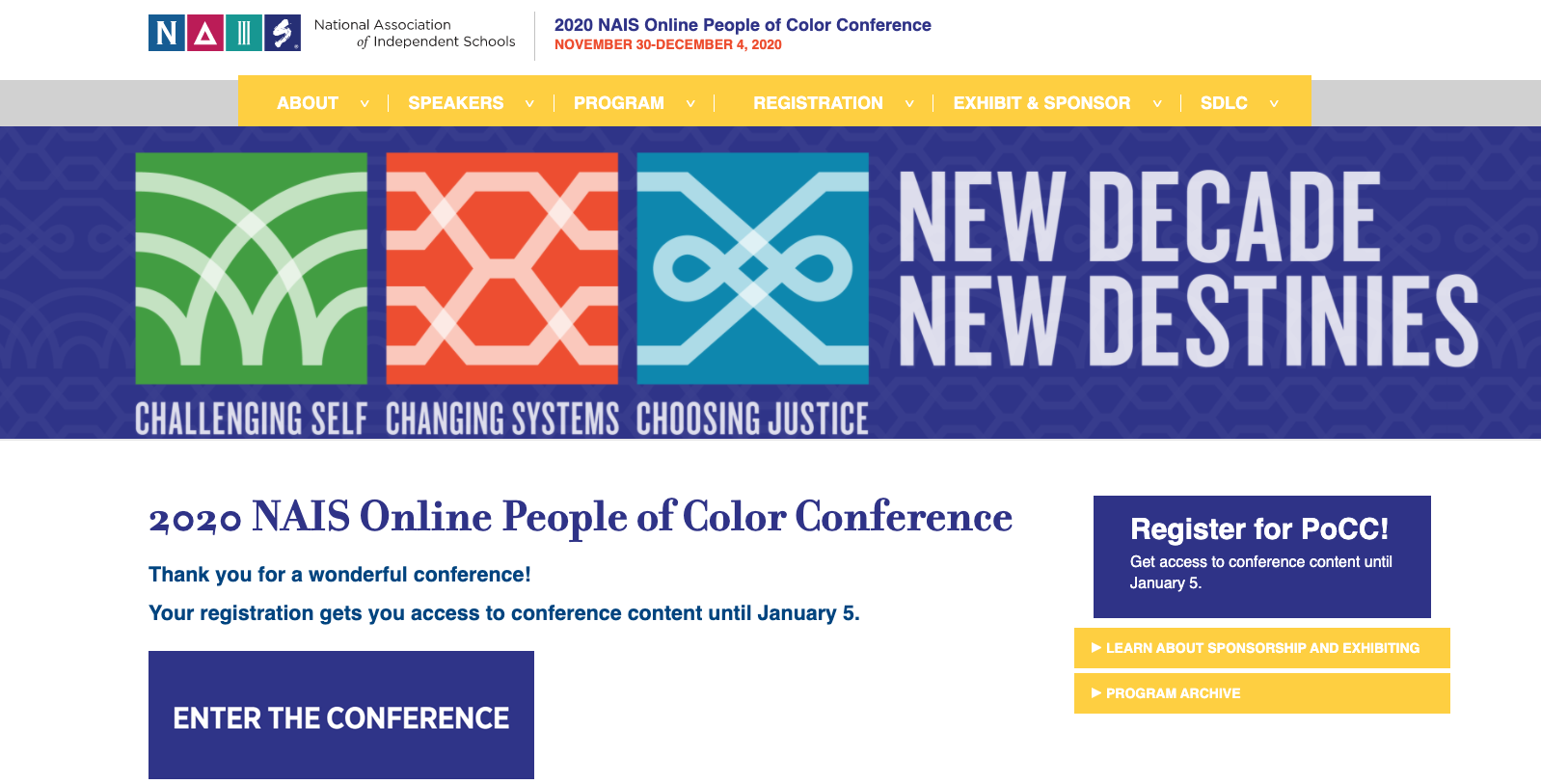
The reflections from some of the attendees of the conference below capture, in part, the power of the virtual event. Connections, conversations, powerful speakers, and equally powerful, intimate affinity group conversations allowed each of us to immerse ourselves in the very difficult conversation of what role independent schools must play in creating a new America. Both the opening keynote address by Eddie Glaude, Jr., the James S. McDonnell Distinguished University Professor and chair of the Department of African American Studies and author of the recently published book Begin Again: James Baldwin’s America and Its Urgent Lessons for Our Own, and the closing keynote by Dr. Bettina L. Love, an award-winning author of We Want to Do More Than Survive: Abolitionist Teaching and the Pursuit of Educational Freedom and the Athletic Association Endowed Professor at the University of Georgia, challenged us to consider the role independent schools have played, and continue to play, in the hoarding of opportunity for some, but not all.
The very economic model of independent schools operates in direct contrast to the notion of equity and inclusion. It has since our school’s were founded, and, in many cases our existence has perpetuated the value gap that exists in society today, the notion that some individuals have more value than others simply because of the opportunities afforded them and the color of their skin. And, yet, as we discussed with colleagues from other schools during the conference, it is possible to hold two contrary truths at the same time, to know that Proctor is making real progress to build a more diverse, equitable, just, and inclusive community AND Proctor must evolve its economic model to build a more diverse, equitable, just, and inclusive community. This notion of simultaneously holding contradictory truths is critical to the Changing Systems Model outlined below. We are engaged in this model as we seek to be as intentional as possible with our work, to challenge the status quo, to refuse to accept the current experience of the marginalized within our community, to, as Eddie Glaude, Jr. implored us, actively build a new America from the ground up, and "not be satisfied to merely tinker around the edges." We must get to work.
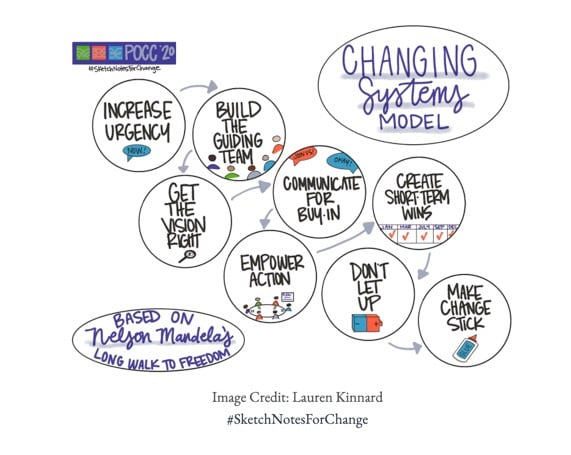
Lori Patriacca ‘01 - Learning Skills and DEIJ Coordinator
This was my third year attending the PoCC and chaperoning the Student Diversity Leadership Conference. Every year is a powerful learning experience that both inspires and humbles. Every year the best part for me has been talking with the students at the end of the day. Hearing them buzz with excitement and ideas, hearing them express the feeling that affinity spaces create where they find that it doesn't take much effort to express themselves and be understood. It affirms their identities, it reveals patterns in the world that they knew from experience but had never been able to put words to. I suppose I love it so much because the rate of learning and transformation is so fast. This year was the first time Proctor has sent more than four adults. We sent a total of 16 faculty and staff, and four board members joined our group as well. Suffice it to say that while the workshops I went to were important and the keynote speakers I listened to inspired tears and renewed my commitment to this work, the real joy for me this year was witnessing 19 adults and 6 students have their eyes open a bit wider, have their world view expand to include the full truth of our country, our school, and individual community members.
Sydney Clark ‘23
My time at SDLC this year was as powerful as my first year as a freshman. Even though I was unable to hug my friends and greet them with warm smiles, the days were still filled with important and exciting conversation, amazing energy and laughter over Zoom, and tears of sadness and happiness as the conference drew to a close on Friday. I learned so much about myself and I have learned that I need to be able to speak my mind no matter what the situation is and make sure that my voice is heard. SDLC has changed my life and I am so grateful. It has given me the tools that I need to make Proctor a better place one day at a time, I am so thankful to have had the opportunity for the second time in a row and I am really excited to hopefully be able to attend this conference for a third time.
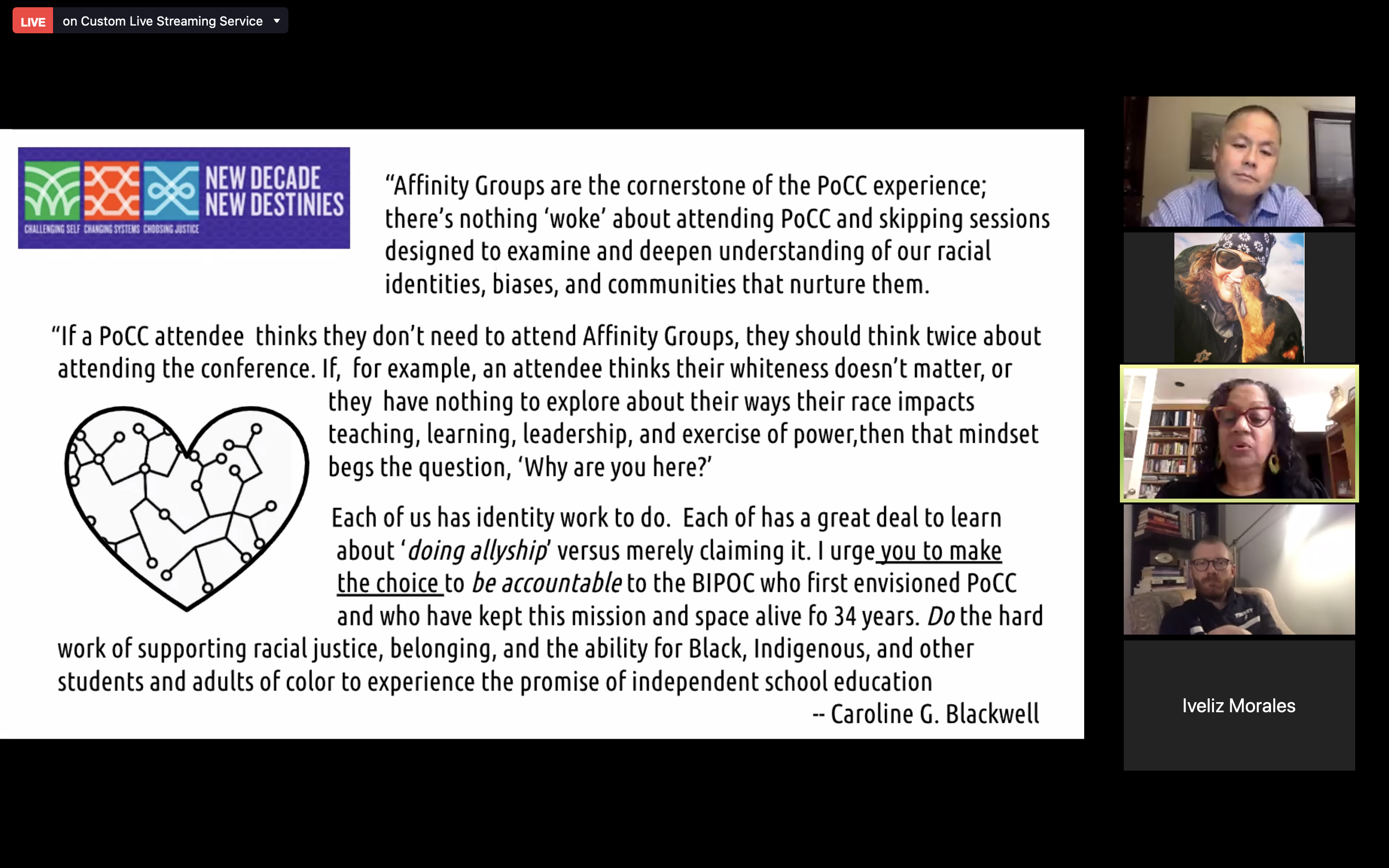
Derek Nussbaum Wagler - Academic Dean
If we truly believe our mission and our community values, then we should not rest until we know that Proctor is a more just, inclusive and equitable place for all. Equity comes in many forms, but where I was struck most following the POCC is how inequitable many traditional grading/assessment practices are. All schools (Proctor included) have a lot of work to do here.
Ellie Moore - English Faculty
I found the PoCC to be both energizing and exhausting. I was simultaneously motivated to jump to action and begin implementing changes toward social justice in my classroom and school community while at the same time needing to sit in deep reflection and process all that I was learning and experiencing. Overall, I am inspired more than ever to do the necessary work and get into "good trouble".
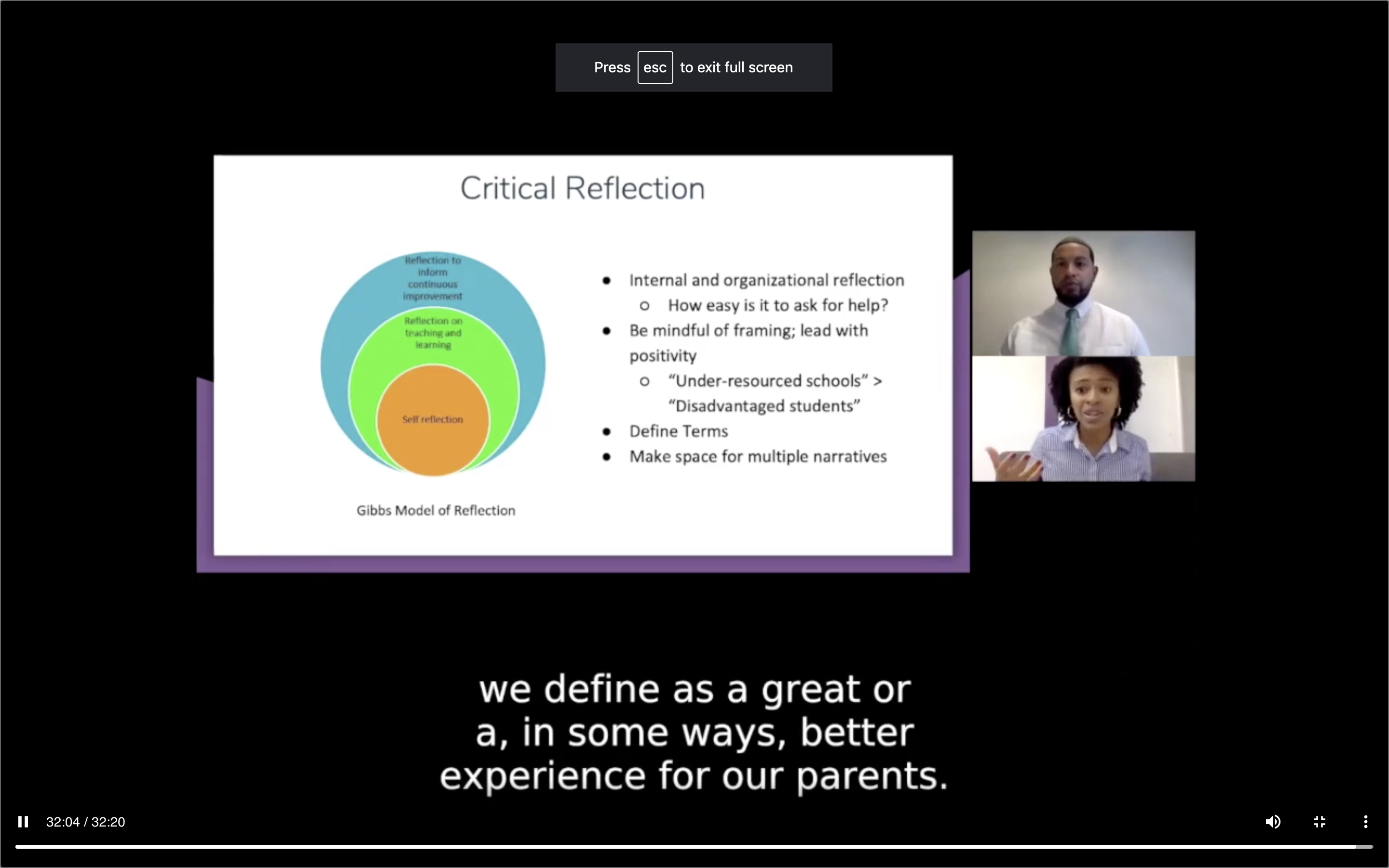
Raz Rasweiler - Learning Skills, Dorm Parent
I had the good fortune to virtually attend the PoCC for the better part of last week. While the conference officially ended on Friday night, the journey has really just begun. Over the weekend I found myself revisiting my favorite speakers from the conference. Relistening to power in their words and in their presence. My greatest take away from the conference? Get. To. Work. We can't just talk about doing this work. We can't just think about doing this work. We need to dig in...with grace and humility, and allow ourselves to make mistakes. Learn from our mistakes....and continue to press on. I'm the quiet one in the back of the room. I am listening. I am processing. I am present, and I am 100% committed to raising the roof with my colleagues to make our school a better place to live, teach, learn and simply be.
Connor Tedesco ‘14 - Director of Alumni Relations
I thought the POC Conference was powerful, insightful, and valuable for Proctor employees to attend, in order to continue the work to better our community. I feel fortunate to have been able to attend, and I'm proud of Proctor for having such great representation throughout the week.
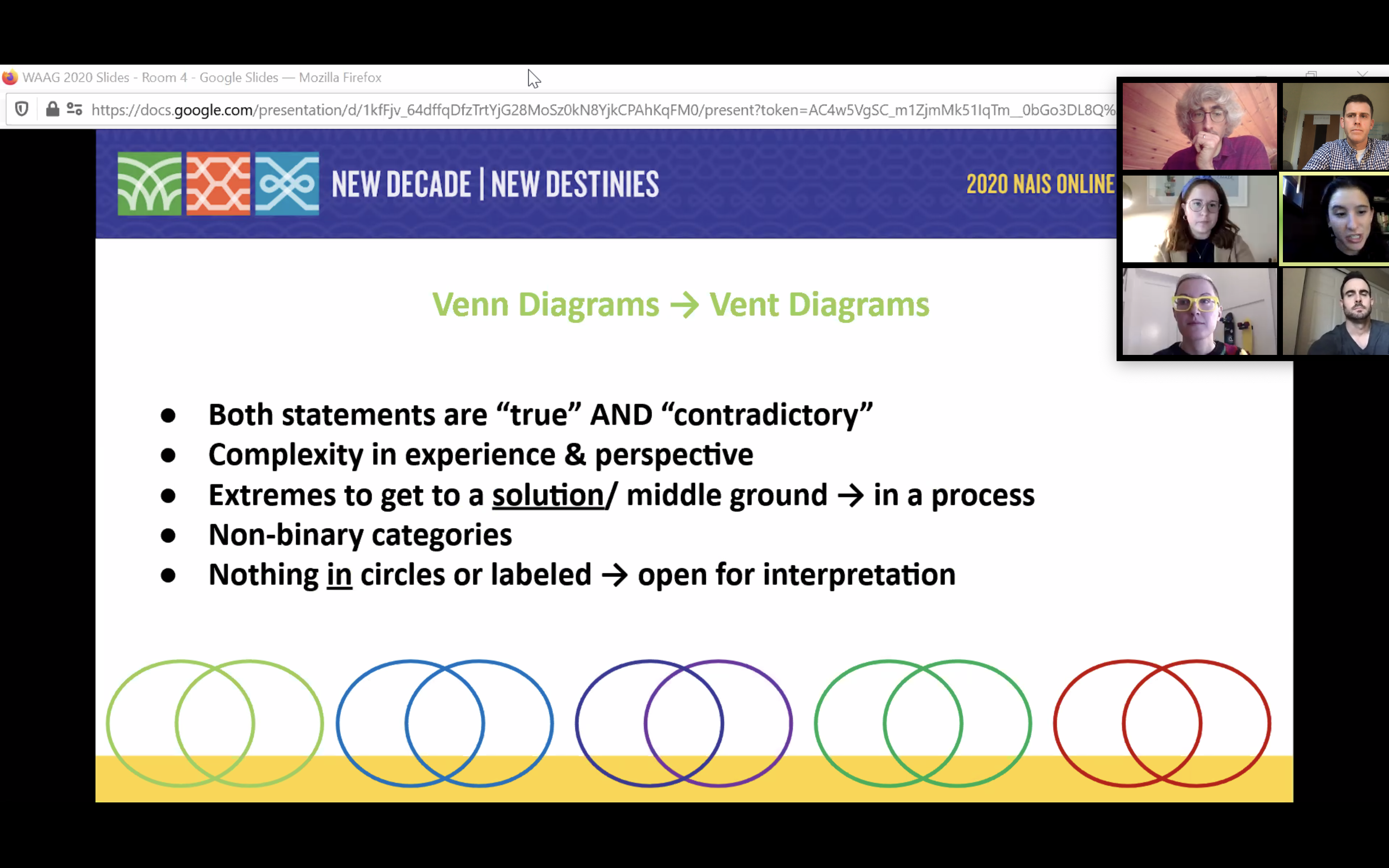
Kristin Nesbitt - Writing Lab and Assistant Librarian
Attending the POCC was an emotional game changer for me and I’m very appreciative that I was given the opportunity to participate. Over the years, I’ve tried to take advantage of opportunities that stretch me personally, emotionally and professionally, and although this conference was virtual, it certainly challenged me on many levels. Primarily I was led into a deeper understanding of perspectives that I’ve mostly read about or experienced through characters in novels or interviews in the media. Of particular interest to me was a workshop on helping transracially adopted students build a sense of racial identity. Understanding the potential trauma involved, curriculum choices that are made, the words such as “adopted” being used, all have an emotional impact. I spent three days listening and observing. I have lots to learn, but my awareness has grown and I feel more competent and conversant now and hope that when these issues come up, as they often do in essays and conversations with students, I’ll be more equipped to handle them.
Seth Currier ‘95 - Proctor Alliance Mentor, Assistant Director of Information Services
Despite being virtual, this year's PoCC was just as impactful for me as it was in 2019. All the presentations I attended inspired a strong desire to act urgently in the Proctor community to bring about systemic changes to benefit the BIPOC community. That desire coupled with the affirmations I received from my white peers from other independent schools helped me to feel invigorated to keep supporting the hard JEDI work on campus. The biggest take away for me was the overwhelming concept of equity and how it relates to systems of power and the need for those systems to relinquish some of the power for the benefit of all. As we find ourselves somewhere in the beginning stages of the Changing Systems Model here at Proctor, it is very hopeful to realize that the very existence of this model proves that true systematic change is possible. I am honored and humbled to have been a part of PoCC 2020 and to support the JEDI goals at Proctor.
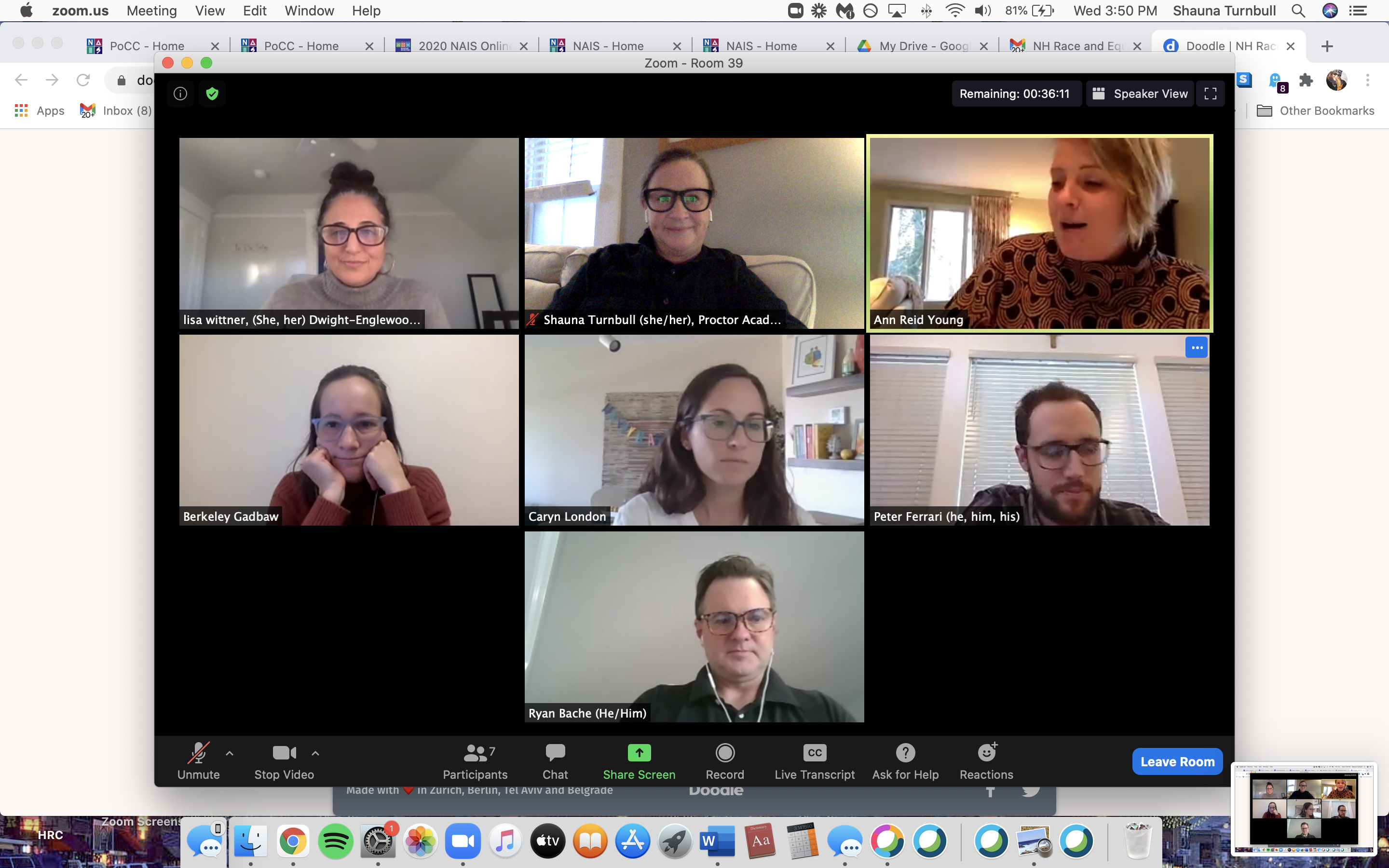
“We have to understand that racial justice, if it is to be genuine, isn’t a philanthropic enterprise, it isn’t an act of charity. If you are to be committed to a genuinely diverse school, you must see it as constitutive of who you are. This is not charity, because if you view it as charity, you hold the belief that equality is your possession to give to someone else. That’s the problem. We have to live into a different way of being together, a different way of doing our work and that means committing ourselves to building a country, to building a school that affirms the dignity and sacrality of every human being no matter the color of their skin, their zip code, who they love, their gender, or ability. It must involve a revolution of value, a shift of who and what we value, an ongoing criticism of the idea of the value gap, the idea that some people because of the color of their skin are more valuable than others. That idea is irredeemable. There's nothing that we can do to save it, but it doesn’t mean we are irredeemable, but in order for this to happen it means we have to tell ourselves the truth about our failures and we have to take the risk to do something bold and visionary.” - Eddie Glaude, Jr.








